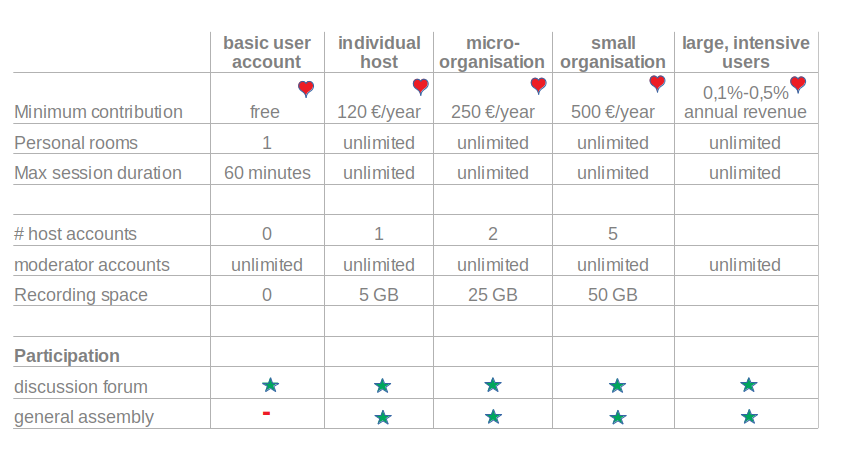Apart from this being the title of an interesting essay by Christian Siefkes it seems to represent the approach we’re exploring within The Online Meeting Cooperative. We try to avoid the introduction of market exchange mechanisms of a commercial service where one side produces and sells and the other side contracts and pays for. Instead we are defining voluntary contributions to make this collective resource work and sustain over time within our ecosystems, with members taking producer and consumer roles whenever they like to. We want this to be a commons, a collective resource contributed to and governed by its members, who can be part of it without high barriers, where knowledge is shared and the resource itself can be replicated at any time.
We request people and organisations to become members and make their contribution through any of the “custodian” member organisations who take the funds in custody for the collective initiative, these to be spent on what is considered necessary for its operation. Also we don’t think that money is the only valuable resource to contribute and in fact many people and organisations are contributing a combination: time spent on relevant tasks, servers and also money. It is this combination of contributions that makes the commons thrive (and more complex!).
At the same time these various types of contributions make it more difficult to value what is contributed. For contributing time we use a time tracker (time.meet.coop). We have defined suggested levels of contribution, which is not a hard “price” that would exclude people who can’t afford it. In fact the level of contribution can vary and might be rather to be that what one can afford, or “from each according to their ability, to each according to their needs.”
On the user account side we aim to be as open and inclusive as we can, which in this initial phase is a collective experiment to find out where are the limits. Of course our servers have at least three types of scarcity, or limited capacity that we will need to take into account:
- bandwidth - videoconferencing takes considerable, see wiki:BBB Bandwidth
- computing power - BBB requires a powerful machine
- storage capacity - videorecordings eat up GBs and TBs rather quickly
So if we find that any of these limits is reached too quickly, one thing to do is to invest more in fund raising to expand our server capacity, another is to have some priority for our members vs those who didn’t contribute at all. This is a dilemma that we should weigh thoroughly.
Some possibilities:
a. we have open registrations and anyone can open up at least one personal room and have sessions with a duration of 60 minutes (the demo server of the BBB project itself does so)
b. allow members to run as many rooms as they want and for illimited duration; request large gatherings to be scheduled on our Event calendar.
c. restrict storing video recordings to members (BBB official project has switched recordings off in their demo).
Another possibility is to have different servers, as we have now, one demo server completely open for the public and one or more production servers dedicated to members or (larger) events (see wiki:servers).
A possible scheme for contributions and membership rights could then be (please criticise!):

Notes:
- contributions can be in monetary terms but also in the form of time and resources (servers)
- the term “minimum” contributions might be better: “suggested contribution level”
- In the design of this Contribution model we’ll want to take into account income inequalities inside the North and with the Global South. See also the thread On Decentralisation. In short: a node in the Southern hemisphere may be able to sustain itself with lower contributions and with solidarity flows within the network.
A note on governance: while we seek rough consensus in our meetings and daily work, important decisions will need to be decided upon by a General Assembly where all members can participate and cast their votes. If we achieve a more decentralised organisation of local/continental nodes, it’ll be clear that many day-to-day decisions can be taken care of by the node and its membership, while strategic decisions will maintain to be made in the General Assembly. There’s lots of details to be discussed to put this into place. Do you think this is the right direction? Please be nice when criticising  and help build this together!
and help build this together!

 It relates to the discussion we will have in
It relates to the discussion we will have in 